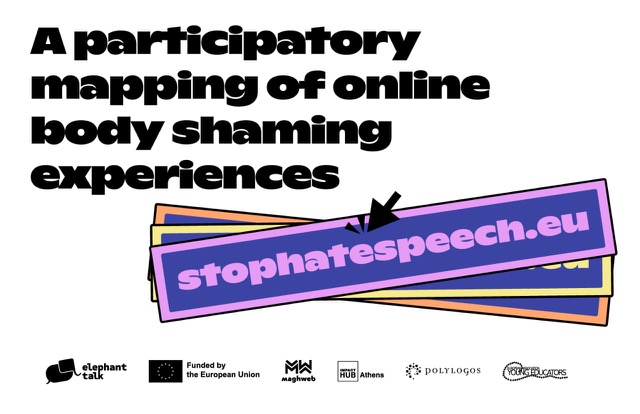Women are still relegated to the domestic sphere and punished when they occupy the public space, online and offline. Online gender-based body shaming is a form of control and punishment.
There are varying definitions and conceptions about what body shaming is and isn’t. But there is no scientific consensus on the definition which can then be monitored. There are lots of institutional statistics about cyberbullying in general, but none that specifically track body shaming.
There is no intersectional perspective on this phenomenon. We donʼt have sufficient information about the prevalence of online body shaming in Europe, its impact on the lived experiences of those who are targeted, the stereotypes and cultural biases that fuel it, or the effectiveness of potential prevention measures. This is a data gap. And itʼs not only a statistical oversight, but missing data that leads to a blind spot in policy.
For all these reasons, through The Elephant Talk project, we have worked to fill this gap, through a participatory mapping of body shaming experiences across 7 countries, involving young people between 15 and 30 years of age.
A total of 706 people took part, and their responses were invaluable in gathering data that we have analysed and presented on www.stophatespeech.eu to explore the phenomenon in depth and provide European wide statistics.
Among the research results, we highlight in particular that Body shaming is:
- a common reality: it is experienced by 20-30% and witnessed by 70-80% of the 706 youths surveyed.
- impactful on mental health, physical health and social behaviour: (on average 4.2 out of 5)
“After being bullied about my body shape, I developed an eating disorder that ended in anemia and hospitalization. Even though I no longer have the disorder, I have a severe obsession with always looking good (makeup, hair, clothes), as if my self-worth depends on it alone.”
- a gender issue: almost half (45%) of male respondents agree that If you expose your body on social media, you need to accept all kinds of comments, and 24% thinks that It is acceptable to express my opinion on a body I see on social media, while the values for female respondents are much lower. Female respondents are two-times more likely to frequently speak out against body shaming.
Victim blaming and fatphobia
Victim blaming is the key is issue: When asked about what actions should be taken to support someone who has experienced online body shaming or whom they should turn to, several other participants proposed answers like “Discounted fitness cards, Fitness, Nutritionists and doctors, Lose weight”.
Respondents also flipped the responsibility directly with phrases like
“Many times it is in the hands of the victim to end the humiliation, To yourself, figure out why it’s happening and improve, Body shaming may be bad, but it usually doesn’t happen to people who look “normal”.”
Fatphobia is also a pressing issue: weight is the most common aspect targeted in body shaming language, with 97% of respondents reporting encounters with weight-related words or insults. Notably, all responses reporting weight-related language associated with body shaming included at least one reference to fat bodies.
Body shaming requires action
What is clear from the research is that body shaming requires action. Most respondents vote for education-related actions (72%) as a way of counteracting body shaming. 80% of participants think platforms should do more to combat body shaming. While less common, other respondents consider stricter reporting processes and legal implications as valid options too.


